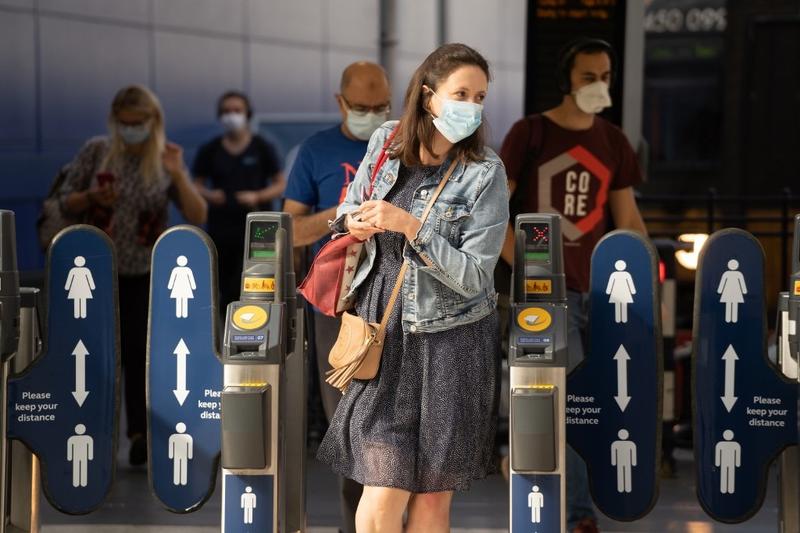 Commuters wearing face masks walk through the ticket barriers at Waterloo Station in London on June 15, 2020 after new rules make wearing face coverings on public transport compulsory while the UK further eases its coronavirus lockdown. (PHOTO / AFP)
Commuters wearing face masks walk through the ticket barriers at Waterloo Station in London on June 15, 2020 after new rules make wearing face coverings on public transport compulsory while the UK further eases its coronavirus lockdown. (PHOTO / AFP)
COVID-19 outbreaks among students in British universities are troubling medical experts, with the potential for transmission of the coronavirus from the young to the vulnerable in society.
Newcastle University said last Thursday that there were 1,003 novel coronavirus cases among students in the prior week, with 12 infections among staff members.
A total 619 students at Northumbria University tested positive for the virus last week, compared with 560 the week before.
This came as Sheffield's two universities last week reported more than 850 cases of COVID-19, with 474 students being diagnosed at the University of Sheffield between Sept 28 and Oct 4, and 336 cases at the nearby Sheffield Hallam University, including two cases among staff, in the same period.
Fan Chung, professor of respiratory medicine at Imperial College London and consultant physician at the Royal Brompton and Harefield NHS Trust, said the increasing rate of COVID-19 cases among students was a concern.
Fan Chung, professor of respiratory medicine at Imperial College London and consultant physician at the Royal Brompton and Harefield NHS Trust, said the increasing rate of COVID-19 cases among students was a concern
ALSO READ: Virus spreading exponentially in UK for first time since March
"Although COVID-19 seems to run a more benign course in younger people, there are a few young people who still might need treatment in hospital and there is also the recognition that young people particularly can have prolonged symptoms of fatigue, pain, breathlessness, brain fog and cough that can continue for a long time after they have recovered from the acute phase," Fan said.
Transmission risk
"The more worrying thing is that the infection may spread throughout the student population and also to other more vulnerable people that the students may come in contact with, such as their lecturers and teachers or other students."
Ian Jones, a professor of virology at the University of Reading, echoes Fan's concerns.
"It is certainly true that younger individuals do not suffer the same degree of serious illness as older groups," he said. "However, vulnerable individuals are still at risk, no matter what the age, and group living should take account of the possibility that some students need shielding."
Karol Sikora, dean of medicine at Buckingham University, takes a more sanguine view on the outbreaks on campuses.
"They are young and have little illness with the infection-many have no symptoms at all. As long as we protect the old and medically vulnerable, we should be fine," Sikora said.
The academic noted that the average age of those who have died from COVID-19 in the UK is 81.
"There are more older people in care homes than in universities, so students tend to remain healthy," Sikora said.
The number of new cases in the past month in the UK has continued to rise, with a seven-day moving average of 14,589 on Oct 12, according to the Worldometer COVID-19 Data.
READ MORE: Official: UK faces 50,000 cases a day by Oct if no action taken
Epidemiologists say it is not surprising that campuses across the north of England have become a hot spot for new cases.
"Localized outbreaks in universities may have partly resulted from a minority that may not be following the advice of social distancing, hand hygiene and wearing masks as strictly as needed," Fan said.
Jones pointed out that the infections certainly could relate to the density of students in their halls of residence. "There may also be a factor of complacency caused by the fact that young people generally do not get serious infections and so do not feel the same need to take precautions," he said.
"Inevitably they mingle so transmission occurs.
"Regular testing on campus would be the most sensible way to manage COVID infection in student populations prior to vaccine rollout."
With Manchester being one of the worst-hit regions in the country, Manchester University, which has reported more than 1,000 COVID-19 cases since Sept 27, has suspended face-to-face teaching and closed nonessential facilities on campus.
wangmingjie@mail.chinadailyuk.com


